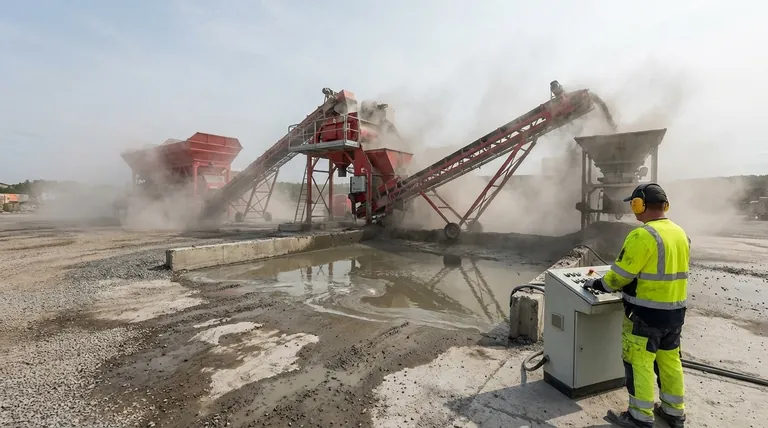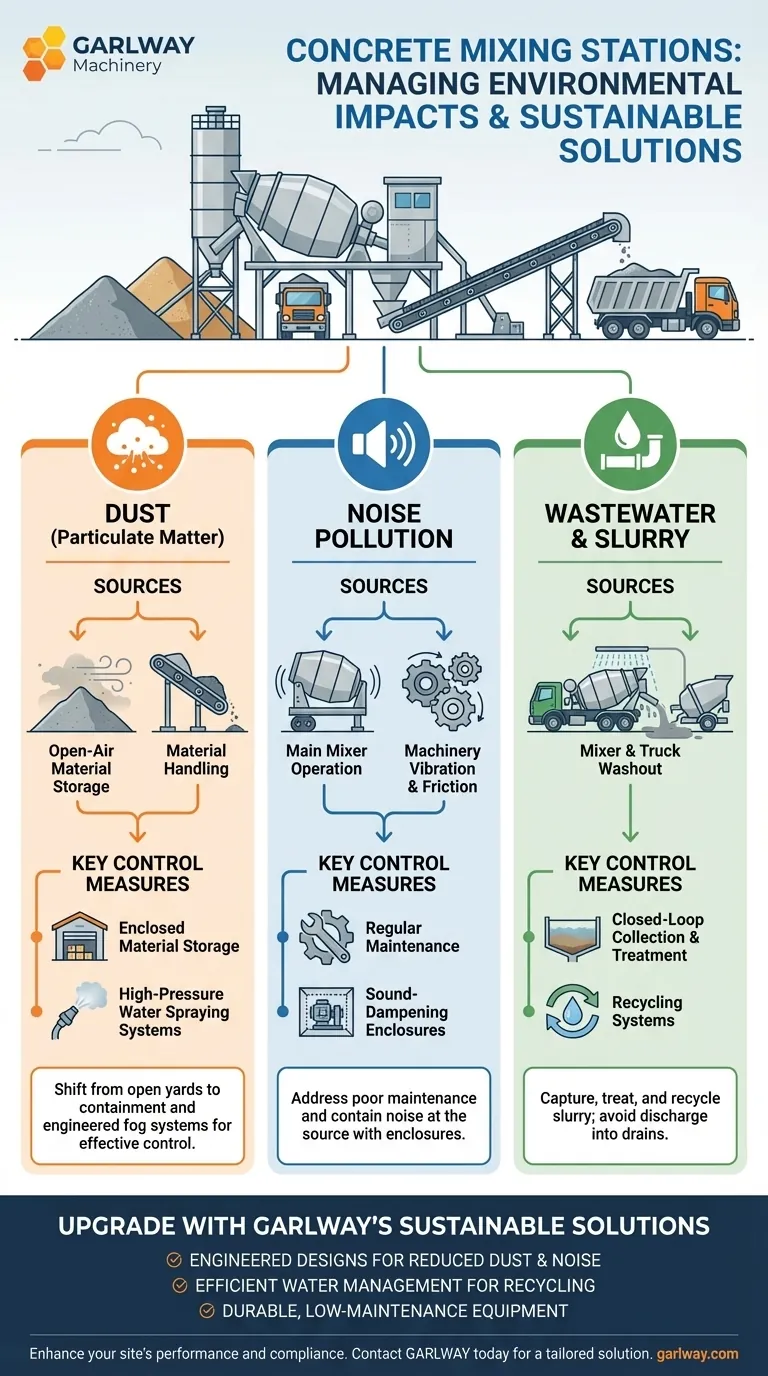The primary environmental impacts of concrete mixing stations stem from three main sources: dust (particulate matter), high-decibel noise, and contaminated wastewater. Each of these pollutants originates from specific processes within the station's daily operations and requires targeted control measures to mitigate its effect on the surrounding environment and community.
While concrete mixing is fundamental to construction, its environmental footprint cannot be ignored. The key to responsible operation lies in moving beyond simply identifying the pollutants and actively implementing engineering controls that address dust, noise, and water contamination at their source.

Unpacking the Sources of Pollution
To effectively manage pollution, we must first understand precisely where and how it is generated. Each stage of the concrete mixing process, from material storage to the final mix, presents a unique environmental challenge.
Dust (Particulate Matter) Pollution
The most visible pollutant is dust, which consists of fine particles of cement, sand, and aggregates that become airborne.
This is primarily generated during the handling and transfer of raw materials. Open-air storage piles are especially vulnerable, as wind can easily lift and carry particles off-site.
Effective control involves physically containing the materials. Shifting from open-air yards to enclosed material storage is the single most effective step in reducing ambient dust emissions.
Additionally, water spraying systems can suppress dust during active material handling. Advanced systems using pressurized pumps and strategically designed nozzles are far more effective than simple sprinklers at knocking down airborne particles.
Noise Pollution
High levels of noise are an inherent part of operating heavy machinery.
The main mixer is the single largest source of noise at a typical station. The immense forces required to combine aggregates, cement, and water generate significant, constant mechanical sound.
Secondary sources of noise come from the mechanical interactions between various components. Gaps or imprecise fittings in machinery can cause rattling and vibrations, adding to the overall decibel level.
Wastewater and Slurry Runoff
Wastewater from a mixing station is not merely water; it is a slurry contaminated with cement, fine aggregates, and chemical admixtures.
This pollution is generated from two main activities: washing out the main mixer and cleaning concrete trucks after they have been filled.
This runoff has a high pH and contains suspended solids, making it harmful to local water systems if not properly contained and treated. It can clog drainage and negatively impact aquatic ecosystems.
The Challenge of Effective Mitigation
Simply being aware of the pollutants is not enough. The true challenge lies in implementing control systems that are both effective and operationally feasible. Ineffective or poorly maintained systems can provide a false sense of security while failing to solve the core problem.
Ineffective Dust Control
A common pitfall is relying on inadequate dust suppression. A simple hose or sprinkler may wet the surface of a material pile but does little to control the dust generated when that material is moved or dropped.
Effective systems require engineering, such as high-pressure atomizing nozzles that create a fog to capture airborne particles. Without containment, suppression efforts are significantly less effective.
Overlooking Maintenance as Noise Control
Noise is often accepted as an unavoidable byproduct of the work. However, much of it can be traced back to poor equipment maintenance.
When components are not properly lubricated or aligned, the resulting friction and vibration amplify the operational noise. Addressing imprecise fittings and ensuring machinery is in good repair is a direct method of noise reduction.
Managing Contaminated Water
The most significant challenge with wastewater is not its collection, but its proper management. This slurry cannot be discharged into municipal storm drains or sewers without treatment.
An effective plan requires a closed-loop system where water is collected, solids are allowed to settle out, and the water is then either treated for discharge or, ideally, recycled back into the mixing process.
A Proactive Approach to Pollution Control
Your strategy for managing pollution should be directly tied to your primary environmental and operational goals.
- If your primary focus is air quality and community health: Prioritize investment in fully enclosed storage buildings and engineered dust suppression systems to capture particulate matter at the source.
- If your primary focus is operational compliance and worker safety: Implement a rigorous maintenance schedule to reduce mechanical noise and consider installing sound-dampening enclosures around the main mixer.
- If your primary focus is protecting local water sources: Design and operate a comprehensive wastewater management system that captures all runoff for treatment and recycling.
Effectively managing these pollutants is not just a matter of compliance, but a fundamental part of responsible and sustainable operation.
Summary Table:
| Pollution Type | Main Sources | Key Control Measures |
|---|---|---|
| Dust (Particulate Matter) | Material handling, open storage | Enclosed storage, high-pressure water spraying systems |
| Noise | Main mixer operation, machinery vibration | Regular maintenance, sound-dampening enclosures |
| Wastewater & Slurry | Mixer and truck washout | Closed-loop collection, treatment, and recycling systems |
Upgrade your concrete mixing station with GARLWAY's sustainable solutions.
As a specialist in construction machinery, GARLWAY provides robust concrete batching plants, mixers, and winches designed with pollution control in mind. We help construction companies and contractors globally minimize environmental impact through:
- Engineered designs that reduce dust and noise at the source.
- Efficient water management systems for slurry recycling and compliance.
- Durable, low-maintenance equipment that ensures long-term operational efficiency and sustainability.
Ready to enhance your site's environmental performance and meet regulatory standards? Contact GARLWAY today for a tailored solution that fits your project needs.
Visual Guide

Related Products
- HZS35 Small Cement Concrete Mixing Batch Plant
- Construction Products Concrete Plant Machine Mixing Concrete Mixer
- Portable Concrete Mixer Machine Equipment for Mixing Concrete
- HZS75 Concrete Batching Plant Cement Mixer Price Concrete Mixer Bunnings Mixing Plant
- HZS180 Ready Mix Concrete Plant for Foundations with Sand and Cement
People Also Ask
- How do you maintain a concrete batching plant? Maximize Uptime & Extend Equipment Life
- What is a drawback of using a high-incline sidewall belt conveyor in wet conditions? Material Adhesion & Spillage Risks
- What is the difference between a concrete plant and a cement plant? Clarify Your Construction Material Supply Chain
- What measures should be taken to prevent rust and corrosion in cement tanks? Extend Your Tank's Lifespan
- What issue should be checked in the safety valve of a concrete mixing plant? Air Leakage is Critical
- What should be checked regarding the safety valve in a concrete mixing plant? Ensure Zero Air Leaks for Plant Safety
- How do you maintain a batching plant? Ensure maximum uptime and concrete quality with a proactive plan.
- What is the process of producing concrete in a Concrete Batch Plant? A Guide to Precision & Quality



















